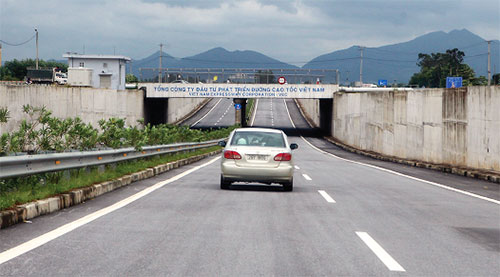Way-out proposed to propel major expressway firm restructuring

The Vietnam Expressway Corporation (VEC) has recently requested that the Ministry of Transport approve the use of capital sources from financially solvent highway projects to fill the capital shortfall in low efficiency projects, thus ensuring a steady cash flow overall, and specifically, for the duration of struggling projects.
If they receive the green-light, the VEC will be capable of finding a financial equilibrium through the use of VND20.36 trillion ($934 million). This capital injection would be drawn from three major expressway projects to ease financial distress at two other crucial projects: the Danang-Quang Ngai and Noi Bai-Lao Cai expressways.
VEC chairman Tran Quoc Viet said, “The traffic volume and toll revenue at our three operating expressways – Cau Gie-Ninh Binh, Noi Bai-Lao Cai, and Ho Chi Minh City-Long Thanh-Dau Giay – have surpassed our projections, helping to significantly improve VEC’s cash flow.”
The latest financial data from the two major expressway projects facing capital distress show a shortfall of VND22.05 trillion ($1 billion) in the money flow, down VND8.83 trillion ($405 million) compared to an estimate from 2014.
If the VEC proposal is approved, the remaining shortage of VND1.69 trillion ($77.5 million) at these two principal highways will be offset by using proceeds from construction bond issuances or bank loans.
“The VEC proposal may be the best possible way-out to advance the shake-up plan of Vietnam’s expressway chief engine, which is responsible for managing more than $5 billion in investment capital,” a senior transport expert commented.
Previously, in a document commenting on VEC’s organisational restructuring and the increased chartered capital proposal sent to the Government Office in June, Deputy Minister of Finance Tran Van Hieu said such a shortfall ($1 billion at VEC’s two major expressway projects) was huge, surpassing the state budget’s affordability limits.
As part of its proposal, the VEC is also seeking permission not to establish joint stock companies for these five expressway projects at this point in time, as well as asking for extended exploitation timeframes for these projects.
According to VEC’s initial estimates, the time needed to recoup capital (for the capital portion raised by VEC) is 23 years for the Cau Gie-Ninh Binh route, 31 years for Noi Bai-Lao Cai, 19 years for Ho Chi Minh City-Long Thanh-Dau Giay, 23 years for Ben Luc-Long Thanh, and 22 years for Danang-Quang Ngai expressway.
These timelines are in place to ensure that VEC can fully repay loans to their two major donors – the World Bank and Asian Development Bank (ADB).
At present, government agencies and sector management have reached a consensus on raising VEC’s chartered capital to more than VND22 trillion ($1 billion) from the current VND1 trillion ($46.7 million). Using this renewed fund of capital, VEC has proposed to extend the exploitation timeframe at these five expressway projects to 42.5 years.
“VEC’s current debt over equity ratio comes to about 53 to 1. Therefore, allowing VEC to increase its chartered capital is necessary to ensure financial security and facilitate capital mobilisation for other highway projects in the future,” said Deputy Minister of Planning and Investment Dang Huy Dong.
What the stars mean:
★ Poor ★ ★ Promising ★★★ Good ★★★★ Very good ★★★★★ Exceptional
Latest News
More News
- Cashless payments hit 28 times GDP in 2025 (February 04, 2026 | 18:09)
- SSIAM and DBJ launch Japan Vietnam Capital Fund (February 04, 2026 | 15:57)
- Banks target stronger profits, credit growth in 2026 (February 04, 2026 | 15:43)
- Vietnam on path to investment-grade rating (February 03, 2026 | 13:07)
- Consumer finance sector posts sharp profit growth (February 03, 2026 | 13:05)
- Insurance market building the next chapter of protection (February 02, 2026 | 11:16)
- NAB Innovation Centre underscores Vietnam’s appeal for tech investment (January 30, 2026 | 11:16)
- Vietnam strengthens public debt management with World Bank and IMF (January 30, 2026 | 11:00)
- Corporate bond market poised for stronger growth cycle (January 28, 2026 | 17:13)
- Vietnam's IPO market on recovery trajectory (January 28, 2026 | 17:04)
















 Mobile Version
Mobile Version